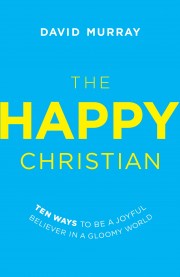The “Positive Mental Attitude” craze some years back always struck me as having a particularly shallow ring to it. The “Just be happy!” happiness it appeared to foster seemed artificial. But then those grumpy and forlorn Christians (sorry, I don’t know how better to describe them) certainly didn’t offer the best alternative either. But then life in this cursed world is marked by suffering of every kind. We each take our turn, and, in fact, some meet suffering in larger doses than most. And then there’s the increasing depression epidemic (can we call it that?) – one in ten Americans now takes antidepressant medication. All the while Jesus tells of “his joy” given to us, and the apostle Paul in fact commands us to “rejoice.” So just how do we sort through all this? Is there gospel help? Is there a “happy” demeanor that ought to mark every Christian? How does – or ought – the gospel inform and shape us in this respect?
Our friend David Murray (professor of Old Testament and Practical Theology at Puritan Reformed Theological Seminary and Pastor of the Free Reformed Church in Grand Rapids, MI) has given this matter more consideration than most, and in his new book, The Happy Christian: Ten Ways to be a Joyful Believer in a Gloomy World, he weighs in on the question with very helpful insight. Today he talks to us about his book and his happy subject.
Books At a Glance (Fred Zaspel):
First, why did you write this book? What made this subject important? How did it gain your attention in the first place? Whom do you have in mind as you write – the sufferer? The grouch? The depressed? And what is your goal? What are you hoping to accomplish?
Murray:
 A couple of years ago, I was reading Gretchen Rubin’s best-selling book The Happiness Project. That led me on to reading a few other popular books on the science of happiness. As I was reading these books, I thought, “This is fascinating and even helpful; but surely, as Christians, we can do even better. If scientists can discover many techniques to make people happy, surely Christians have many truths to make people happy.”
A couple of years ago, I was reading Gretchen Rubin’s best-selling book The Happiness Project. That led me on to reading a few other popular books on the science of happiness. As I was reading these books, I thought, “This is fascinating and even helpful; but surely, as Christians, we can do even better. If scientists can discover many techniques to make people happy, surely Christians have many truths to make people happy.”
I also wrote it as the flip side to my other book Christians Get Depressed Too. Indeed, I might have entitled this book, Christians Can Be Happy Too! I just felt that many Christians were allowing themselves to be dragged down by the general negativity in the culture and wanted to provide a Gospel-centered antidote.
But I also wanted to draw non-Christians to the Christian faith by showing the positive benefits of joyful Christianity, not only for eternity, but also for everyday life.
Books At a Glance:
Okay, help us get on target: Describe the “happiness” you’re talking about. You’re not denying sin and its effects. You’re not denying that we live in a world marked by its fallenness. And you’re not saying that Christians shouldn’t feel pain or cry. So, in large perspective, what does Christian happiness look like – and not look like?
Murray:
Too many books on happiness, even Christian books on happiness, have been completely unrealistic. They haven’t dealt with the massive problems of sin and suffering in the world and in our lives. I try to tackle these issues head-on throughout the book.
I define happiness as a “God centered, God-given sense of personal well-being that flows from a right relationship to God in Christ and that flows out in worship of God and service of others. It’s centered in God, not in ourselves or our circumstances; it’s founded upon the Gospel; and it results in actions that glorify God and do good to others. And when I say it’s God-given, that recognizes God’s sovereignty in this whole area. However, that’s not to deny human responsibility to work hard to seek happiness in God-approved ways and areas of life.
Books At a Glance:
How is this subject important specifically for Christians? Secular therapists can tell us to be happy too, but what is distinctively Christian about the counsel you give in this book?
Okay, that’s a big question – a brief summary will do. J
Murray:
The book’s emphasis on biblical truth as the fuel for Christian joy distinguishes it from many books focus on techniques or which try to produce joy from the fumes of short-term emotional experiences. Instead of trying to create joy out of mystical and esoteric spiritual techniques, the book shows that biblical happiness is worked out and found in a God-centered approach to ordinary everyday life; in our media choices, our workplaces, our marriages, our homes, our churches, and so on.
Another way the book is distinctively Christian is that it takes a biblical lens to happiness research. I highlight areas where God, in common grace, has allowed scientists to discover some truth about what produces human happiness. For example, scientists have found out that giving produces more happiness than getting, praising makes people happier than criticizing, meditation and gratitude also increase happiness. However, I go on to show how the Bible defines and describes these activities in a way that produces deeper, longer, and more beneficial happiness than anything the scientists can promise.
Happiness is an important subject for Christians because, as science has demonstrated, it strengthens and improves every area of our lives – our relationships, our physical and mental health, our spiritual growth, our education, and even our careers. But this shouldn’t surprise us, as a few thousand years ago, Nehemiah told us “the joy of the Lord is your strength!”
Books At a Glance:
Explain for us what you refer to, in connection with Paul’s letter to the Philippians, as “choosing a deliberate imbalance,” and explain the spiritual exercise associated with it. How can we cultivate Christian joy?
Murray:
It’s not just Christians who think that consuming too much of today’s media is damaging for us. Even secular commentators are increasingly recognizing the destructive effects of over-exposure to our news and entertainment media. We need to heed the Apostle Paul’s call to change our media diet: “Brethren, whatever things are true, whatever things are noble, whatever things are just, whatever things are pure, whatever things are lovely, whatever things are of good report, if there is any virtue and if there is anything praiseworthy—meditate on these things.” In this “epistle of joy,” Paul is not arguing for unrealistic isolation from the bad news that inevitably fills a fallen world. No, this is not a warrant for monasteries and convents; but it is a warrant, and even a demand, that we choose a deliberate imbalance in favor of what is inspirational and wholesome instead of the mainstream media’s imbalance on the side of what is dispiriting and gross.
Books At a Glance:
To give our readers a taste of what they will find in your book, tell us of some specific applications you make. You want to talk to us about joy in what specific areas and responsibilities of the Christian life?
Murray:
I try to tackle areas that we might not instinctively consider as joy-producing. For example, for many people, work is an obstacle to joy, it’s something you have to do in order to buy some joy when work finishes. However, a biblical view of work and of vocation can transform the most mundane, boring, and even unpleasant task into a spiritual activity that is Christ-directed and soul-nourishing. Often, it’s not changing our jobs that will make us happy, but changing our attitude to our jobs. That’s why I spend a chapter on developing a biblical workview that can produce joy in what is usually a very large part of our lives.
Another example is church. Again, for many people, church has been a disappointment. Or, more specifically, people in churches have been disappointing. Hypocrisy, double-standards, injustice, gossip, etc., have made church a place of pain rather than pleasure for many. I try to help people overcome their church scars and turn back to the church rather than turn their backs on it. I want people to have a much more Christ-centered than Christian-centered view of church. And I show people how to get good even from some bad Christians.
A last example, and an important one for me, is building more biblical diversity into our personal lives and churches. For many people, the idea of welcoming people of a different color or ethnicity into their lives or churches sounds like a loss. I demonstrate, from both the Bible and personal experience, how it’s actually a gain rather than a loss.

